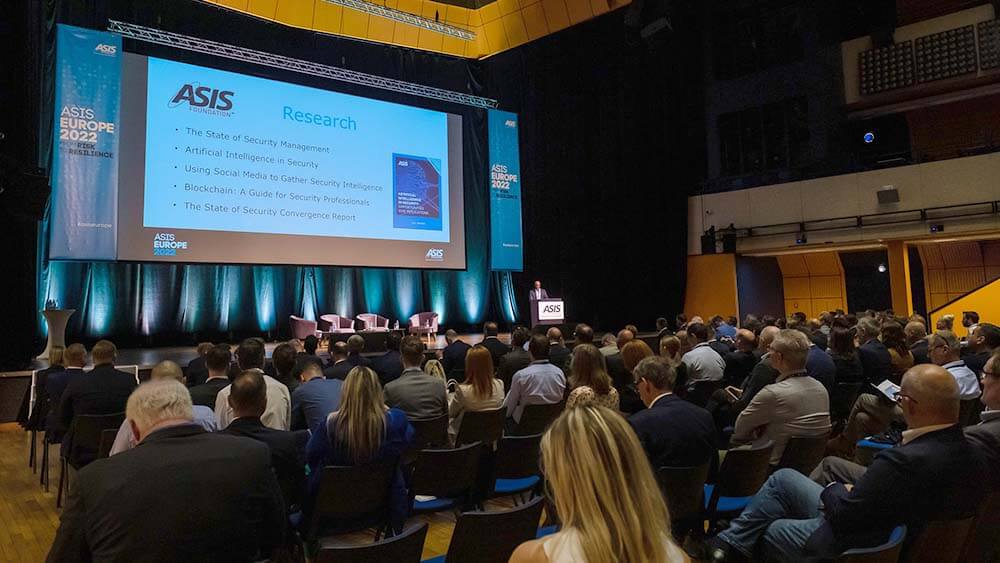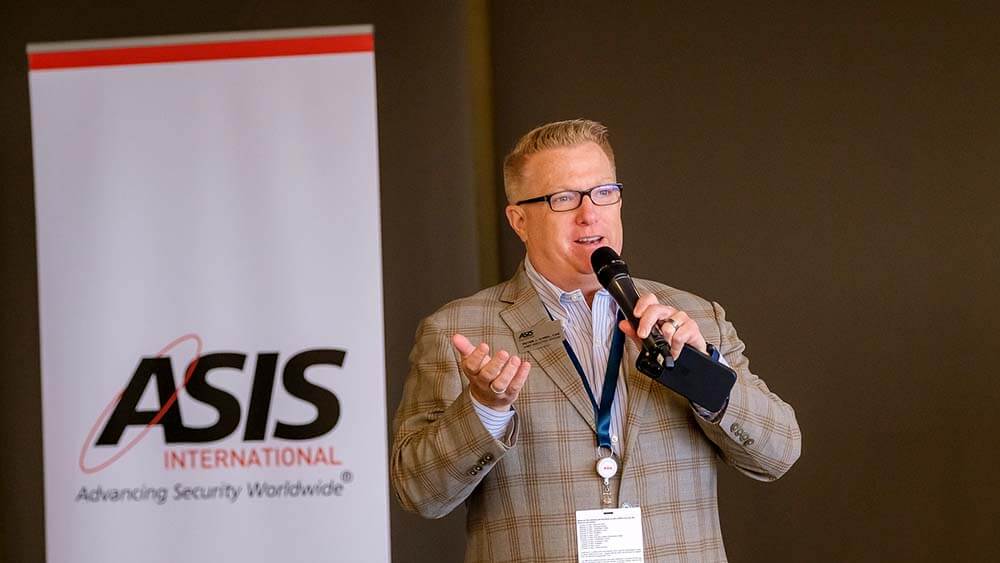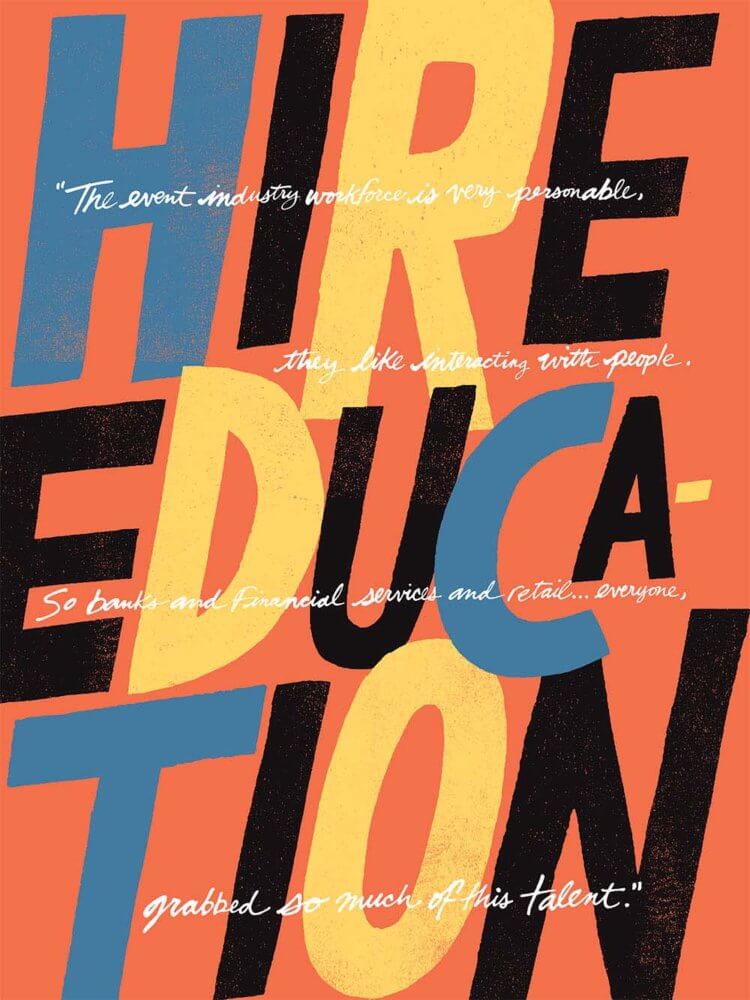
Security professionals gather at the ASIS Europe 2022 conference, May 22-24 at the Prague Congress Centre in the Czech Republic. ASIS International is restaffing its events team after reductions during the pandemic.(Photos courtesy of ASIS International)
Alexandria, Virginia–based ASIS International was in the process of rebuilding when the pandemic hit, and as a result, COVID “whomped us,” Peter O’Neil, FASAE, CAE, told Convene. The association for security professionals, where O’Neil became CEO in 2016, has a large network of partner organizations, chapters, and other constituent groups, and produces events ranging from local chapter gatherings to international trade shows. Like many other organizations, O’Neil said, “we had to reduce our workforce during COVID, and we let all but one of our live meeting staff go at the time because we really did not have a financial choice, unfortunately,” he said. One of the “very talented” event staff who was furloughed, he said, won’t return, because he feels he’s been “burned” by the events profession at large.
“I think, too, that we lost some good people in this part of the profession as a result of how they put their heart and soul into all they did, only to be furloughed and/or laid off. Even if they know intellectually it wasn’t their fault, it was still a kick in the gut,” he said. “And then I think there is burnout. I think people with a certain amount of experience who were in a certain financial position, said, ‘No, I am not working those hours anymore. I am not taking those trips anymore.’ Even me. I am not necessarily on the meetings-only side, but I was traveling 200,000-plus miles a year before the pandemic. It was nothing to fly to Dubai for a two-day meeting or conference and come back. And now two years in, I evaluate trips much differently — there must be a different imperative for me to physically go to a location. So, I think you see a lot of turnover and change happening in the profession for these reasons, and others, without question.”
One ability O’Neil looks for in his staff, regardless of position, is a general understanding about the organization and the industry they serve as a whole, and he has found that event organizers sometimes lack an enterprise-wide view. “Sometimes it feels like some in the professional meeting space see themselves potentially as a vertical,” he said. “At ASIS, whether you’re in the meetings department or you’re the chapters department, you’ve got to understand the ASIS mission and landscape of the organization, and you’ve got to be at least ‘cocktail conversational’ about the profession. For example, if you bump into a member, we expect everyone on our team to be able to talk at some basic level about what is happening in the profession. I think some meetings professionals sometimes think, ‘Oh, I’m a heads in beds and butts in seats person, I don’t have to be concerned about content or issues impacting the profession that I serve.’ I think that is an incorrect viewpoint.”
About that bit concerning taking a stand on issues: O’Neil said he thinks “where the Millennials and the Gen Zs that are coming in are going to push us as organizations is on the social justice and/or broader ESG type movements.” As the father of two adults in their early 20s and a 16-year-old, O’Neil has insight into the next generation entering the workforce. “I think the days are gone where organizations — including my own — can say, ‘That’s happening over there and we’re over here.’ For example, ASIS is an organization that historically doesn’t make statements. We are politically agnostic. And we’re global, which adds in a layer of issue-management complexity. If we follow an issue in the U.S., for example, we have to be prepared to follow the same issue globally. So culturally, we have been an organization that has not taken positions. And I think where the younger generation will broadly push us will be that being silent will no longer be acceptable. They expect us to say something, even if they take issue with it.”
Along the same lines, associations, O’Neil thinks, are in a unique position to attract talent, given “the erosion of trust in government, in the Fourth Estate, and, generally speaking, the erosion of society. Associations still play an important — and maybe an even more important — role because people still trust us,” he said. Therefore, there may be a greater onus on associations “to make statements about social issues that are organization supported,” he added, “as opposed to remaining silent.”

Peter O’Neil, CEO of ASIS International speaks at ASIS Europe 2022 in May. O’Neil told Convene he now weighs the value of business trips, adding “there must be a different imperative for me to physically go to a location.”
Restaffing the Events Team
As ASIS staffs up its events team, O’Neil said, “we are definitely looking for digital skills, and somebody with DES right behind their name is certainly attractive.” At the onset of COVID, the live meetings team was moved away from one “stovepipe,” overseen by the chief marketing officer responsible for events, business development, marketing, communications, and creative services, and placed into the content team, he said. “We quickly realized early in COVID that we were going much more digital than we already were, and we needed to link our events team directly with our content team.” The head of events now oversees all channels — hybrid, digital, and live, in partnership with content peers in the organization.
Finding a candidate who understands how to plan “a good, solid, digital-only event, a good, solid, live-only event, and a good, solid, hybrid event” has been a challenge, he said. O’Neil said they haven’t been able to fill an open planner position for six months, so they have been using two contractors instead. “We won’t hire just to hire,” he said.
Which speaks to other qualities O’Neil said he looks for in his staff, in addition to the ability to execute: “Are you going to honor our cultures of transparency, of diversity, of treating people fairly and equitably, of being inclusive of others? Are you going share knowledge? Are you a continuous learner? Do you bring what you’ve learned back to the team? When you have a conflict with somebody, how do you handle it? If your ‘how’ is not as strong as your ‘what,’ you likely won’t make it on the ASIS team.”
That speaks to the culture of an organization, and just as O’Neil said he won’t “hire just to hire,” he won’t “retain just to retain.” Keeping under- performers employed — even in a market where there’s a talent shortage — sends a bad message to the entire team, who see that as proof, he said, that you’re not “honoring the culture and the values that you’ve said are important.”
Michelle Russell is editor in chief of Convene.
Hire Education — Read the Stories

Convene’s August CMP Series cover package examines the talent challenge the events industry is facing. Below are links to all the stories in the package.
- Is the Talent Challenge Choking the Business Events Industry’s Recovery?
- It’s Time to ‘Think About Talent Differently’
- Stopping the ‘War on Talent’
- ‘Everybody Is Having a Difficult Time Attracting Talent’
- Expanding the Events Industry Talent Pipeline
- The New Events Staffing Landscape is ‘Unsustainable’
